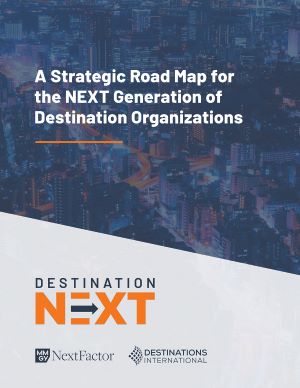
The pandemic has accelerated forces already in motion that will transform the way DMOs collaborate with and impact the communities they serve.
In the future, DMOs will need to broaden their mission beyond simply marketing tourism offerings in an easily defined geographic area to larger regional representation, and work closer with stakeholders from both the private and public sectors.
To help provide a roadmap to DMOs, MMGY NextFactor conducts a bi-annual global survey about key travel trends, industry strategies, shifting organizational roles and key performance indicators.
[Related: 4 Trends for CVBs/DMOs Post-Pandemic—And What They Mean for Planners]
The 2021 survey received responses from 706 participants from 52 countries and was supplemented by more than 150 interviews with global leaders in tourism, hospitality, business events, transportation, technology, economic development, education, urban design, esports and other sectors.
The resulting DestinationNEXT 2021 Futures Study, released in summer 2021, compiled by MMGY NextFactor for Destinations International (DI), identified three common themes from the results:

- Much greater awareness among governments and community leaders about the impact that tourism and business events have on their destinations.
- There has been exponential growth in attention focused on the environmental impacts of tourism and the importance of diversity, equity and inclusion at all levels of the sector.
- There is an ongoing re-evaluation of the tourism marketing sector’s purpose, values, roles and performance indicators.
“There was pretty much a sense that everyone was reassessing what they do and how they do it, and to get their boards in line through a new mandate for the future,” said meetings industry veteran Greg Oates, senior vice president of innovation for MMGY NextFactor. “In some ways, things are pretty good—business was good [before the pandemic], and the industry was eager for that to return—but we’ve also learned how connected our industry is with other things, and what can we do with that increased awareness of how we’re all interacting—destinations, communities and the planet—and have a much broader, systems approach to how we do business.
“But when push comes to shove,” Oates pondered, “are we really going to build back better, or are all the industry stakeholders just waiting for the old status quo to return?”
Free On-Demand Webinar: CVB/DMO Update: Leveraging Bureaus to Ensure Safety and Save Costs]
Results From the DestinationNEXT Client Panel
The DestinationNEXT 2021 Futures Study also reported findings from six advisory panels, including a client panel comprising meeting planners, event organizers and tour operators.
Meetings Today touched base with Oates to get his take on eight key observations from the client panel.
1. Hybrid meetings are here to stay based on the widespread adoption of video conferencing during the pandemic.
“That’s the big, ‘monster under the bed’ for the meetings industry. Because when you’re talking to all the partners at the hotels, who think once COVID is over, it’s going to die away, how do you talk about it as additive and a way to bring in more sponsors? You may get 6,000 attendees at an event, but there’s another 30,000 around the world who may be interested. That’s only going to expand. The challenge is the business model to educate and show the long-range plan here. Smaller meetings and corporate meetings could take a hit.”
2. The business events industry is increasingly adopting a regional hub model where business events take place concurrently in different destinations worldwide.
"Some organizations are developing one event in multiple locations around the world at the same time. The idea is that more people will be able to attend in destinations closer to their home. The opportunity is to increase attendance, membership, new partnerships, etc., because it’s easier for more people to access with shorter travel time and less expense."
3. Managers now need to go to greater lengths to justify the travel costs for face-to-face meetings, for both corporate travel and business events.
“There’s going to be more of a focus on paying for people to travel long-haul. What’s interesting from this research is that across Europe there’s a real fear around ‘flight shaming,’ the idea that do you really need to create that carbon impact? In general, meetings and events owners need to make the business case stronger than ever about why people should come.”
4. Diversity, equity and inclusion (DEI) have become among the biggest priorities for how association event professionals choose site locations.
“This idea that these DMOs can embrace DEI by making sure their boards are diverse is really just the beginning. Making sure that the supply chain and vendors are diverse is [increasingly important]. There’s so much demand from our supply chain for transparency around this. How can you make sure the economic impact is impacting the overall community and all socioeconomic segments?”
5. Business event clients are looking for more help and flexibility to manage risk.
“Short- and medium-term, the meeting planner shouldn’t bear all the risk of whether the event is successful or not, such as no attrition, no minimums. The industry has typically looked after the industry on the supply side. Moving forward it’s how well the destination can cater to the individual customer, so being more customer centric. The question is how much of that is talk and how much is that is a real shift?”
6. Venues need to continue to invest in workforce development to improve digital literacy.
“If we see events more and more marrying the physical and digital, then the people that are working in hotels and conference centers need to be upskilling and training. You see some places—Long Beach Live is a good example; it’s basically converting the entire convention center district into a digital platform and they’re selling that as an entire citywide digital experience. Demand is there that will drive development, job growth, upskilling and all of that, for sure. This is thinking two or three years down the road. There’s going to be a lot of evolving in this space.”
7. Sustainability is now much more important for event owners and their partners.
“It’s not just about sustainability—such as replacing plastic straws in hotels—it’s being more relevant and progressive. This is top of mind for younger planners and attendees. This is where it gets really nuanced; it’s how a city aligns around resilience and sustainable development goals. If it’s an imperative for cities than it will have to be for DMOs. There’s been a huge push on cluster leverage. It’s not so much in terms of attracting business event development—we secured this tech event because we have so many tech companies—but what did it accomplish in the destination to measure [and continue] that success?
“And because COVID has hurt the global supply chain, a priority is to strengthen the local supply chain. That goes back to sustainability. That’s the big conversation heading into 2022, but at the same time there’s a lot of cities that aren’t ready to have that conversation.”
8. Destination organizations need a more regional vision to connect event owners with a broader range of intellectual capital.
“Speaking with association planners especially, was this idea that we want more from a DMO than just what was within their borders—this idea of being a hub in a distributive network. If a DMO is replying to a bid, an RFP, don’t tell me just what’s in your city, but how are you connected to the supply chain network to bring more customers/sponsors? To be more of regional collaborator and more of a concierge.”
See the entire DestinationNEXT 2021 Futures Study.
Read Next: Why 3 Veteran DMO Execs Joined Forces for Tourism and Destination Recovery







